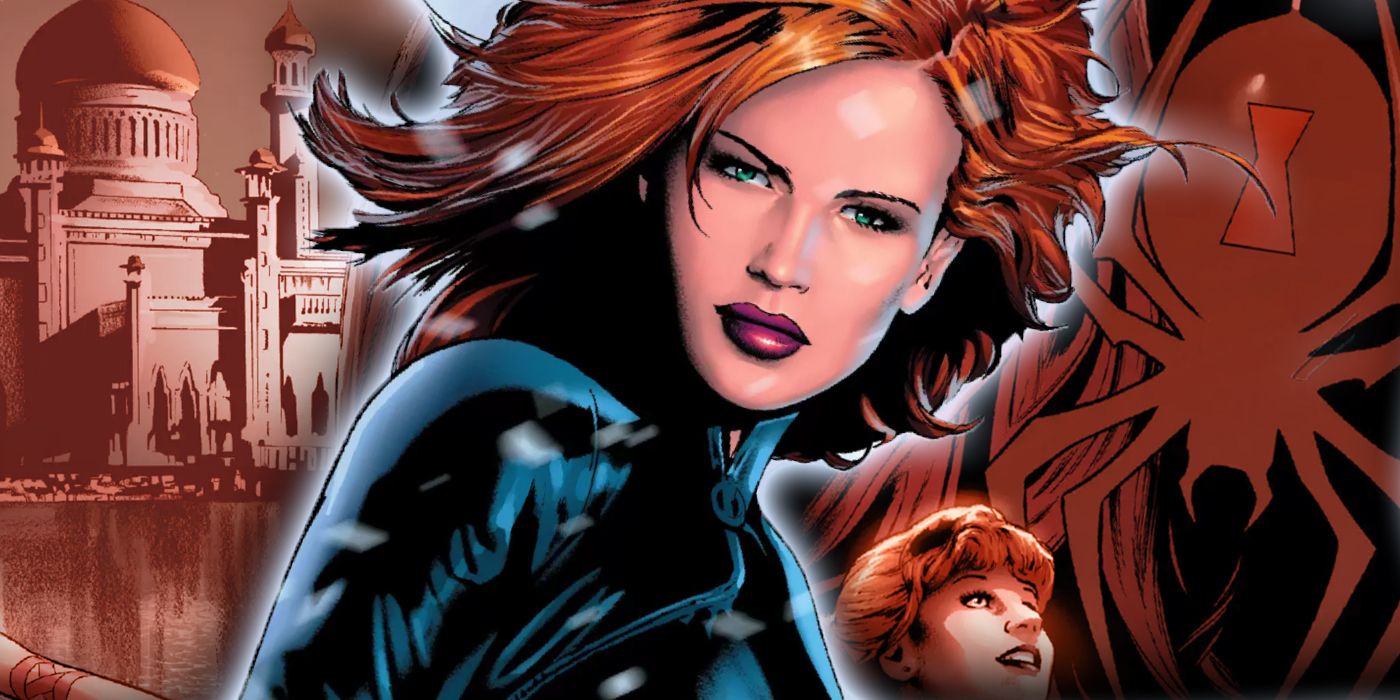
In the latest Comic Book Legends Revealed, find out what would have happened in the unpublished third volume of Richard K. Morgan's Black Widow series of miniseries.
Welcome to Comic Book Legends Revealed! This is the eight hundred and eighth installment where we examine three comic book legends and determine whether they are true or false. As usual, there will be three posts, one for each of the three legends.
NOTE: If my Twitter page hits 5,000 followers, I'll do a bonus edition of Comic Book Legends Revealed that week. Great deal, right? So go follow my Twitter page, Brian_Cronin!
Richard K. Morgan's third volume of his Black Widow miniseries, had it been published by Marvel, would have seen the Widow assassinate the President of the United States.
True Enough for a True
Richard K. Morgan took control of the Black Widow in her 2004 miniseries, Black Widow: Homecoming, with artists Bill Sienkiewicz and Goran Parlov...
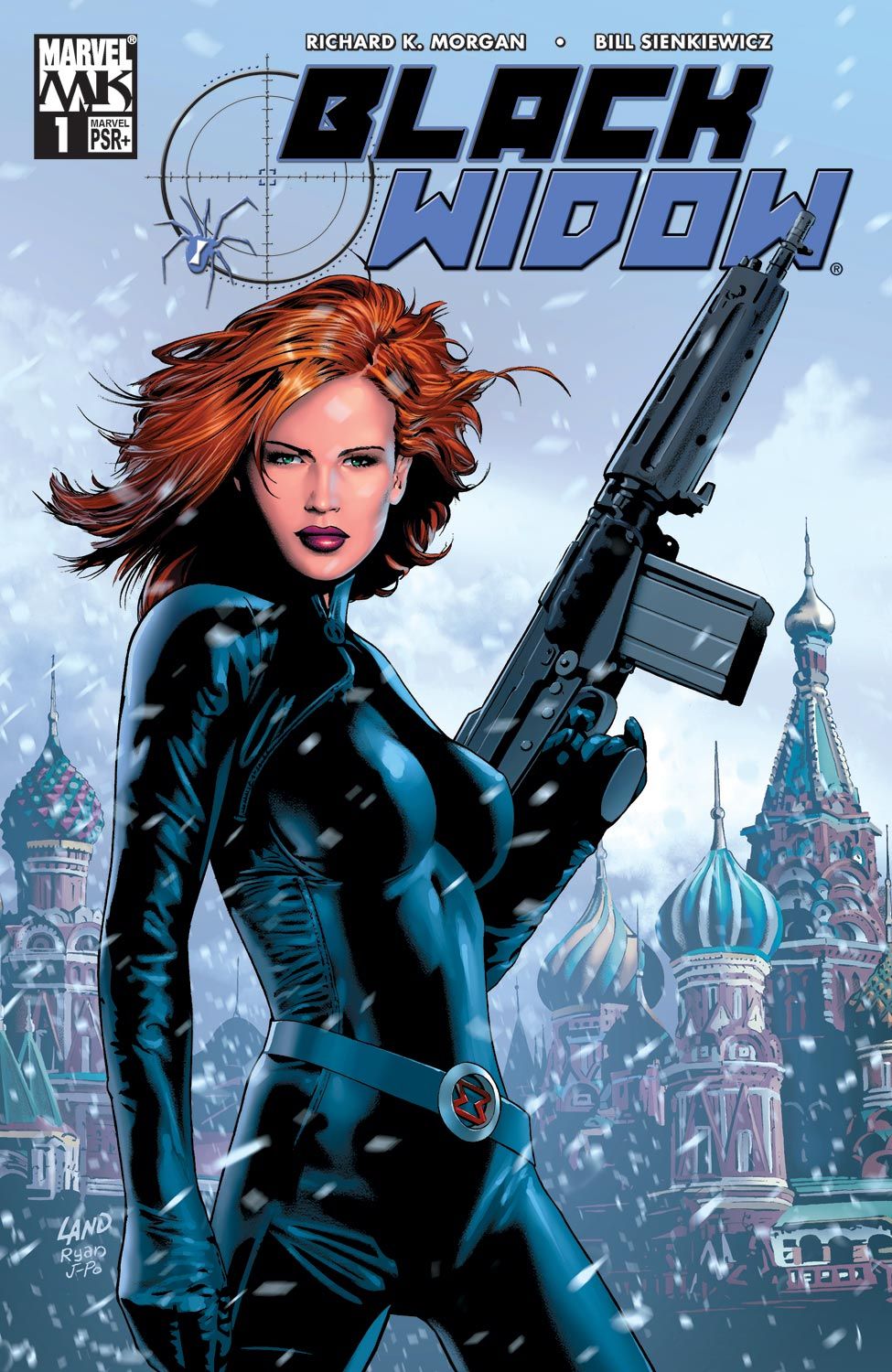
Morgan did a number of things with the character in this series that resonate to this day, but he also introduced ideas and removed concepts that later writers dropped and brought back respectively, so the legacy of the Morgan miniseries are really not quite as extensive as you might think for a series that did a LOT of big changes in it. One of the longest lasting parts of the series was something that the Marvel Cinematic Universe adopted that I don't believe is even necessarily canon in the Marvel Universe. I'll talk about that in a future column (maybe).
In any event, Morgan did a sequel miniseries with artists Sean Phillips and Bill Sienkiewicz called Black Widow: The Things They Say About Her. The series picked up on the events of the first series, but also expanded the scope a good deal, especially in terms of bringing Daredevil into the series, as well.
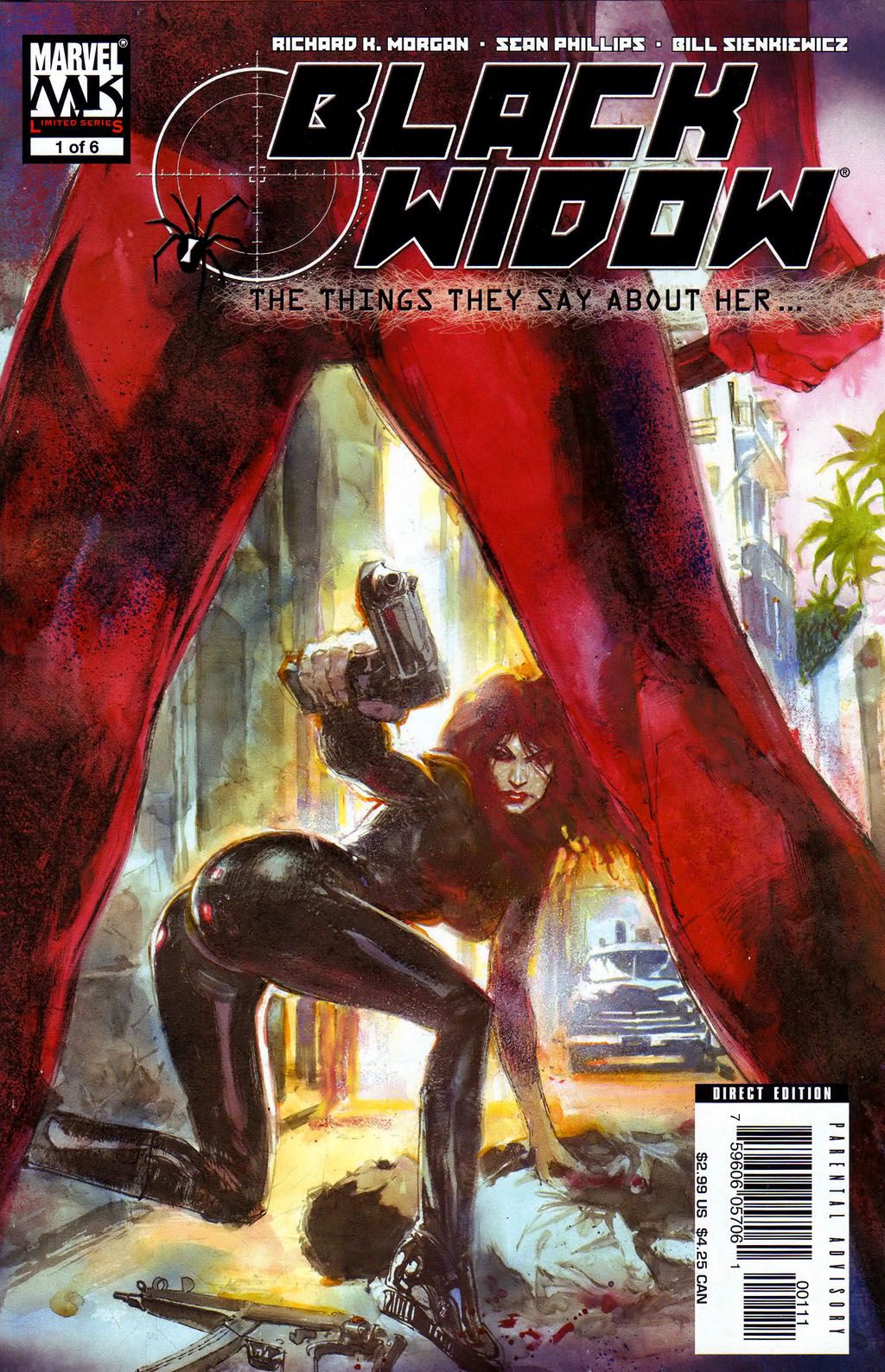
One of the things that Morgan stressed in his Black Widow comics was to make sure that she was not the secondary character of her story and thus, Daredevil's role in the series is very much a supporting one instead.
In any event, the series ended in one of those extremely obvious "there are more stories to come" stories, as Morgan takes sort of an Empire Strikes Back type of ending, where things are bleak for our heroes, but they are hopeful that they will take the bad guys down still, even though one of the people that the bad guys control in the President of the United States! The series ends with this striking two page piece by Morgan, Phillips and Sienkiewicz showing the set-up...
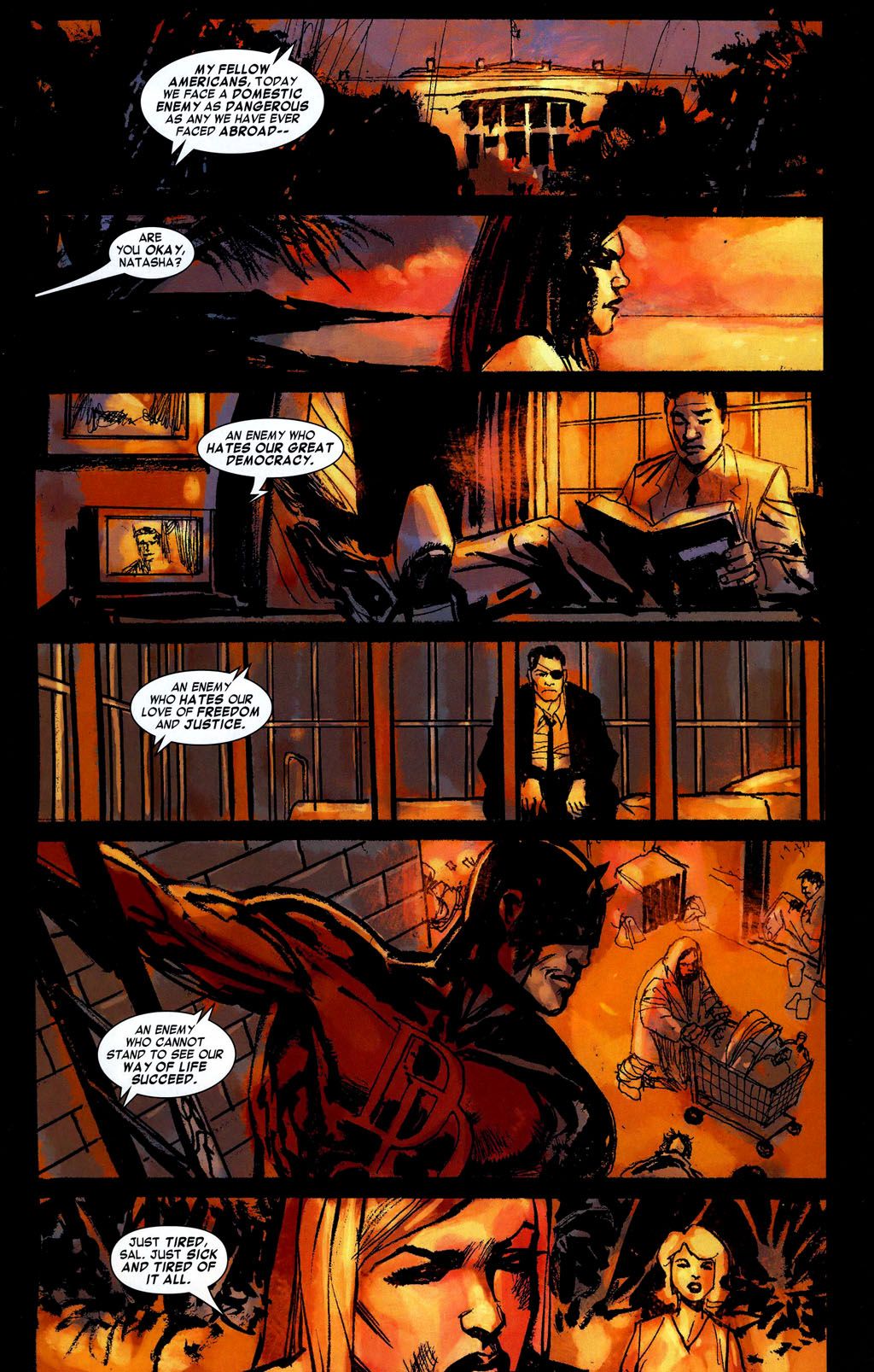
See how bleak stuff is?
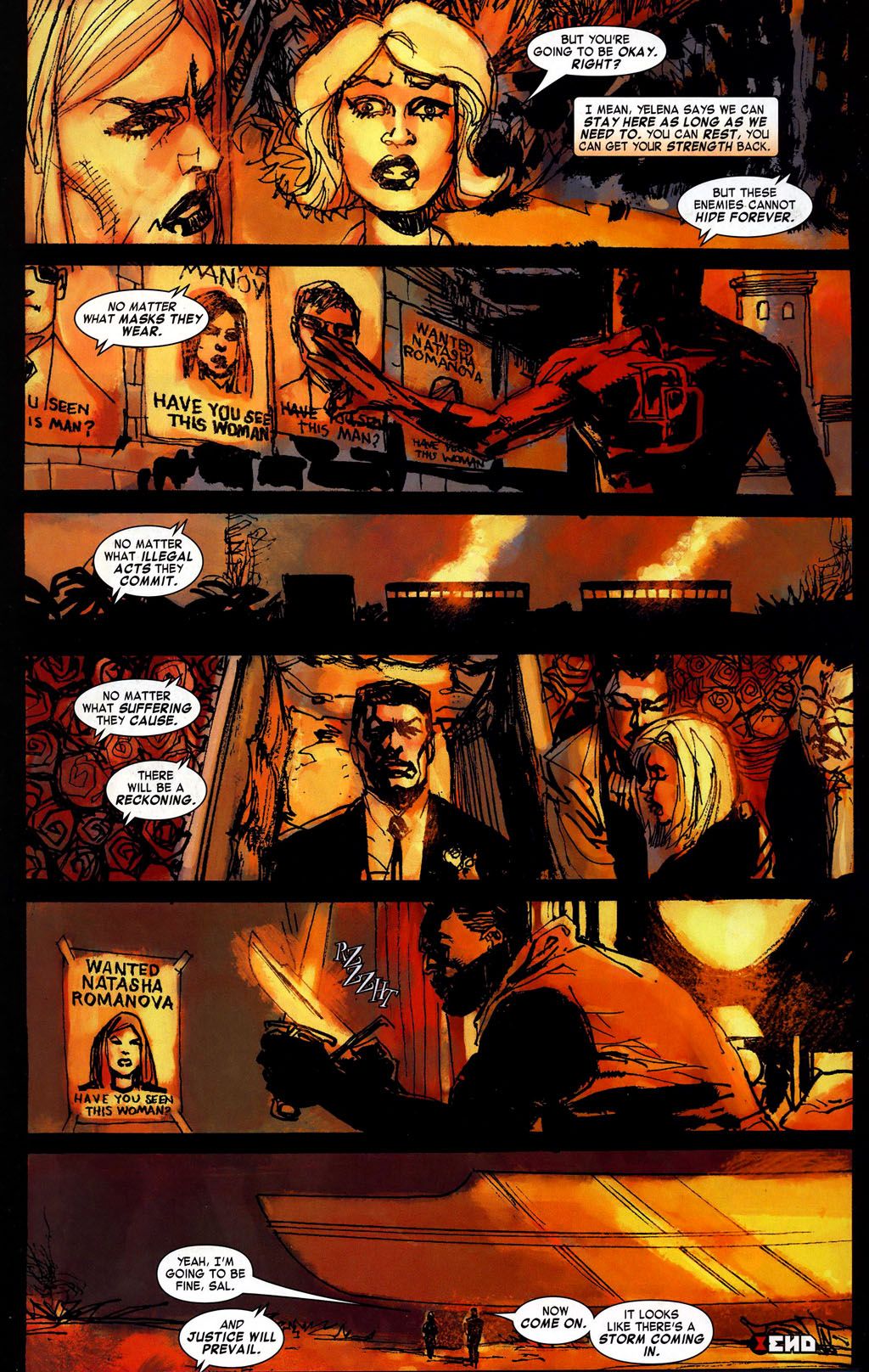
But, well, there WAS no third Morgan Black Widow miniseries. All of his plots were just dropped, basically.
Well, around the time that Avengers: Age of Ultron was released, Morgan did an excellent interview with Charlie Jane Anders at i09 (MOST Charlie Jane Anders interviews are awesome, so I know I'm not narrowing things down that much) and Anders asked Morgan what the plans were for the third series...
Well, to say it was plotted out would be dignifying the state of play a bit too much, I think. But certainly the second volume in the run, The Things They Say About Her, ended on a deliberate Act 2 low-point — the Widow and Matt Murdock both on Homeland Security’s Most Wanted List, Nick Fury banged up in Guantanamo as a traitor, corporate assholes in control of the White House and a puppet President, an ex-Navy SEAL assassin on the Widow’s trail, paid by Miami gangsters but driven by a personal thirst for vengeance (Natasha killed his father), and America spiralling into the grip of a Military Industrial Complex police state.
Quite how we were going to pick the bones out of all that in a further six issues, I wasn’t quite sure — and in the end never had to find out! — but salient factors were going to be the Widow assassinating the President, a dirty-deeds back-door CIA hit squad called INSERT, and the reappearance of Lyudmila from Homecoming with some helpful biotech tips and upgrades. Ultimately, superannuated Soviet relics were going to save America from its own worst excesses and help restore a modicum of democracy — neat irony, huh?
Of course, it was insane to think that Marvel would ever have run with something like that, or that it could find a decently large audience in the core fanbase, not five years after 9/11, in the midst of the biggest and ugliest military misadventure abroad since Vietnam and with cheap chest-beating patriotism being stoked like crazy everywhere you looked. Truth is, I’m lucky they even let me get away with Volume 2! But like I said, I was a newcomer to comics back then, and painfully naive about it all.
Now, as you can see, even Morgan concedes that it might have been too much for Marvel, but it is interesting to note that the second miniseries WAS a Parental Warning, Explicit Content comic book, so I think Marvel would have gone for it...had it approved of the third series PERIOD, that is, but as Morgan notes at another point in the interview, the sales were not good, so that's likely why we never saw part three.
Thanks to Tom A. for suggesting this one and thanks to Anders and Morgan for the fascinating information!
Check out some other entertainment and sports legends from Legends Revealed:
1. Just What IS the Lyric in ELO’s “Don’t Bring Me Down” That Sounds Like “Bruce”?
2. Did Zootopia Originally NOT Star Judy Hopps?
3. Did Pete Maravich Correctly Predict His Own Death?
Check back later for part 2 of this installment's legends!
Feel free to send suggestions for future comic legends to me at either cronb01@aol.com or brianc@cbr.com
0 Comments